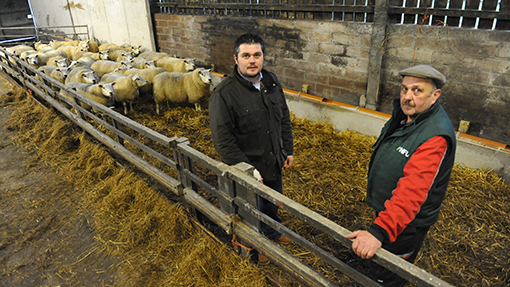Welsh CAP plan will hit profit, say farmers

Farmers have voiced their concern at the Welsh government’s plan for a three-tier CAP payment system based largely on productivity.
From 2015 1 January lowland farmers will get the top rate of €240/ha under the framework for direct payments devised by the administration in Cardiff.
The exact payment rates won’t be known until after farmers have submitted their claims in 2015 but they are likely to be:
€20/ha for moorland
€200/ha for severely disadvantaged areas
€240/ha for disadvantaged areas and lowlands.
A cap will be put on large payments with a system of progressive deductions up to €300,000.
The minister will allow farmers five years to adjust to the new payment system from the current historic payment model. By 2019 payments will be wholly based on the area of land farmed.
But farmers say the plans will hit profits.
Richard Isaac (pictured with his son Matthew), who farms in a severely disadvantaged area of Wales, reckoned he would be about £2,000/year worse off under the new direct payment system. This is on top of the £10,000 he lost when the Tir Gofal environmental scheme was replaced with Glastir. Until last year his annual Tir Gofal payment had been £15,000 compared with the £5,000 he now gets under Glastir.
The timing of the changes couldn’t have been worse because his two sons, Matthew and Daniel, have joined the business. “The farm minister keeps saying he wants to encourage young people into farming but he seems to be doing anything but,” insisted Mr Isaac, who runs a beef and sheep enterprise at Mynachdy Farm near Pontypridd.
“Matthew has just come home to farm so there is an extra wage to find and now we are losing more income.”
His annual direct payment is likely to be €200/ha compared to the €240/ha Abi Reader is set to receive as a lowland farmer. She questions why the Welsh government has categorised lowland and disadvantaged areas together.
“Surely we need to protect our most productive land and a four-tier system with different rates for lowland and disadvantaged areas would surely have been the best way of achieving this,” said Miss Reader, who runs a herd of 190 dairy cows at Goldsland Farm in the Vale of Glamorgan.
The business, which she runs with her parents and her uncle, has already embarked on a programme of efficiencies to reduce costs and she questions the farming minister’s assertion that cutting direct payments will make farmers more competitive. “I already work an 80-hour week. Does he want me to work longer hours or cut staff numbers?”
Alun Davies’ decision to opt for the highest modulation rate in Europe is what concerns her most. “A lot of businesses in Wales and struggling with TB and will take a long time to recover from last year’s severe weather. I think the minister could have come to more sympathetic conclusions than he has.”
But beef farmer Philip Jones says farmers are wrong to direct their anger at Alun Davies. “I wouldn’t like the job of sharing out Wales’ CAP budget. There is no point in us going for Alun Davies’ throat, he is just the postman delivering the news whether we like it or not,” said Mr Jones, of Lan Farm, Cynwyl Elfed.
“My biggest concern is that he should now focus on doing everything he can to protect the family farm and to help more young people to get into agriculture.”
(More on CAP reform .)
